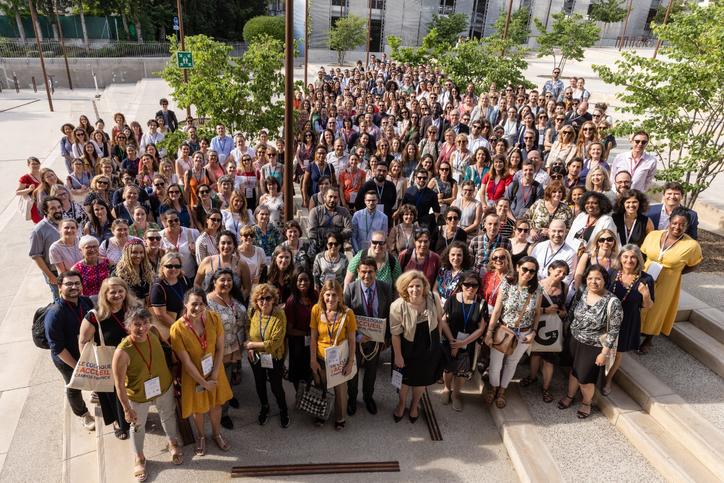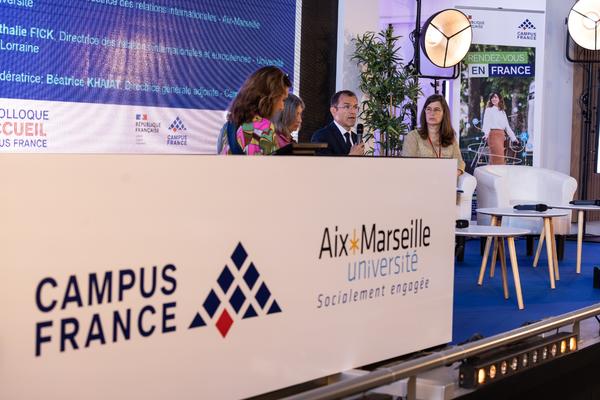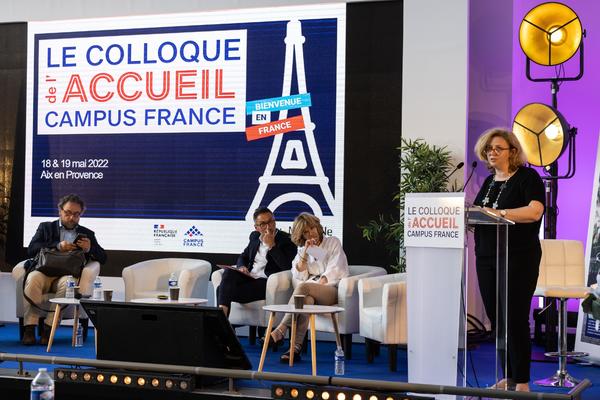
Conference on student reception by Campus France: the collective challenge of international students’ reception in France
Acing the reception of international students in France is everyone’s business. Everybody, at their own level, whether higher education institutions, supervising ministries, operators and institutional partners, cities, regions, associations, all stakeholders of the chain of reception met to debate on this observation during the two days of the conference of reception held by Campus France from 18 and 19 May in the offices at Aix-Marseille University.
Ouvert par Donatienne Hissard, nouvelle Directrice générale de Campus France, le Colloque de l’accueil a renoué avec les traditionnelles rencontres des spécialistes français de l’accueil international qui n’avaient pu avoir lieu en présentiel depuis 2019. Dans la continuité des Jeudis de l’accueil, qui s’étaient déroulés sous une forme virtuelle l’année dernière, le colloque 2022 a réuni plus 400 personnes, représentant 163 établissements d’enseignement supérieur français, pour sept tables rondes plénières et quatre ateliers.
Des retrouvailles autour de quatre grandes thématiques
Un "moment de joyeuses retrouvailles". C’est en effet en ces termes que la Directrice générale de Campus France a souligné l’importance de ces nouveaux échanges entre tous les partenaires, "au moment où l’on enregistre un rebond dans la mobilité étudiante", au moment "où la compétition internationale dans ce domaine va reprendre de plus belle et où la qualité de l’accueil va représenter un élément clé de l’attractivité de la France". Selon Donatienne Hissard, il était ainsi temps de se retrouver pour "prendre la mesure des avancées déjà effectuées et des défis qui restent à relever".
Quatre grandes thématiques ont structuré le Colloque de l’accueil :
-
la nouvelle politique nationale en matière d’accueil : la stratégie "Bienvenue en France" et la labellisation des établissements ainsi que les avancées en matière de visas et de séjour ;
-
l’action des opérateurs de l’Etat, avec la présence du CNOUS, de la CNAM et de la CAF, et l’action des régions et des collectivités locales avec l’Observatoire territorial de la mobilité internationale ;
-
l’Europe, avec l’accueil des étudiants ukrainiens et une comparaison des systèmes d’accueil dans quelques pays européens ;
-
les actions et les initiatives concrètes d’intégration, un aperçu des bonnes pratiques développées sur le terrain par les établissements d’enseignement supérieur français.

La diplomatie universitaire à l’œuvre
La stratégie "Bienvenue en France" lancée en 2018 par le Gouvernement, unanimement saluée par les participants, a été le fil rouge des échanges du Colloque. La 1ère table ronde a fait un point d’étape concernant l’appel à projets du fonds d’amorçage du dispositif qui a déjà permis à plus d’une centaine d’établissements de bénéficier d’une aide pour améliorer l’accueil. L’importance de cette diplomatie universitaire à l’œuvre sur le terrain, soulignée par les intervenants, repose en effet sur la qualité de l’accueil et la mobilisation de tous pour réussir cette chaîne de l’accueil, les établissements d’abord, mais aussi l’ensemble des partenaires. Dans cet esprit, la labellisation des établissements (138 à ce jour), est clairement apparue comme un des piliers de la stratégie "Bienvenue en France" et semble avoir constitué un véritable catalyseur des énergies pour développer partout, parmi les établissements labellisés, de nouvelles bonnes pratiques en matière d’accueil.
Dans ce contexte d’amélioration, la modernisation en matière de visa et de séjour, avec notamment la création du portail France-Visas et la nouvelle Administration Numérique pour les Etrangers en France (ANEF), ont suscité de nombreux débats dont les maîtres mots ont été simplification, numérisation… mais aussi nécessité d’un accompagnement humain !

Opérateurs et partenaires incontournables
Les principaux interlocuteurs et opérateurs incontournables de la chaîne de l’accueil avaient tenu à être présents au colloque organisé par Campus France. Ont ainsi animé une table ronde qui leur était dédiée, le CNOUS, qui a présenté ses multiples services et mis en avant l’importance du partenariat dans toutes ses actions, mais aussi la CNAM qui a développé l’offre de santé pour les étudiants internationaux, ainsi que la CAF qui a présenté ses nouvelles plaquettes d’information.
Les collectivités territoriales, notamment les régions et métropoles qui représentent également "un élément fondamental de l’ouverture à l’international et du rayonnement des territoires" étaient elles aussi présentes au Colloque de l’accueil pour le lancement de la 2e édition de l’Observatoire territorial de la mobilité des étudiants et des chercheurs étrangers en France. Ce recueil, notamment statistique, réalisé par Campus France et commandité par le ministère des affaires étrangères, est le résultat d’une collaboration inédite avec Régions de France, France Urbaine et l'Association des Villes Universitaires de France (AVUF). Il offre un regard original sur les stratégies territoriales d’internationalisation et les dispositifs de soutien à la mobilité.

A l’heure de l’Europe
Au moment où la France assure la Présidence du Conseil de l’Union Européenne, mais aussi pendant que fait rage la guerre en Ukraine, les participants ont fait le point sur l’accueil en France des étudiants et des chercheurs ukrainiens dans le cadre du dispositif "Urgence Ukraine". Ont ainsi été évoqués notamment :
-
la coordination autour de la stratégie "Bienvenue en France" de l'ensemble des acteurs (Préfectures, CNAM, CNAF, CROUS) pour l'accueil des réfugiés;
-
la mobilisation des établissements qui recensent pour le Ministère de l'Enseignement supérieur, de la Recherche et de l'Innovation les étudiants déplacés par la crise qu'ils accueillent directement;
-
la plateforme d'urgence mise à disposition par Campus France, qui permet aux étudiants déplacés en Ukraine bénéficiaires de la protection temporaire d'être mis en relation avec des établissements prêts à les accueillir.
Une autre table ronde était consacrée à une comparaison européenne des systèmes d’accueil, notamment aux Pays-Bas avec la présence d'une représentante de l’agence nationale NUFFIC, mais aussi en Estonie (avec l’Université de Tallin) et d’ESN France (Erasmus Student Network).

Bonnes pratiques et boîte à outils
Dans la quasi totalité des tables rondes et des ateliers, des représentants des établissements de l'Enseignement Supérieur et de la Recherche français (universités et écoles) ont livré leurs témoignages sur les différents thèmes à l’affiche.
La participation active des établissements a été notable lors de la table ronde sur les établissements labellisés, mais aussi pour la session sur les actions d’intégration, les parrainages et l’organisation des Nuits des étudiants du monde, lors des ateliers sur l’accompagnement socio-psychologique des étudiants et dans celui sur l’accueil en amont de l’arrivée, sur les accueils hybrides ainsi que sur les modes d’accueils multi sites et mutualisés. Autant d’interventions, en séance et lors des questions/réponses avec la salle, qui peuvent fournir une mine de bonnes pratiques pour leurs homologues et constituer une "boîte à outils" de l’accueil sur le terrain.
Related contents
Recommended News




















































